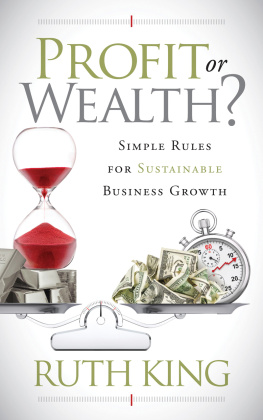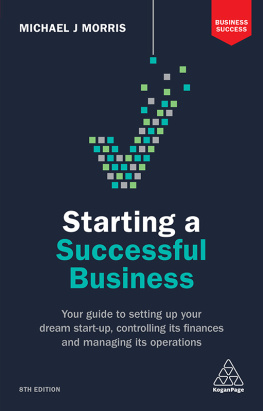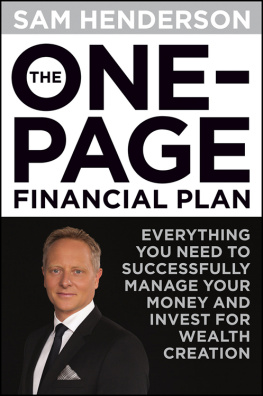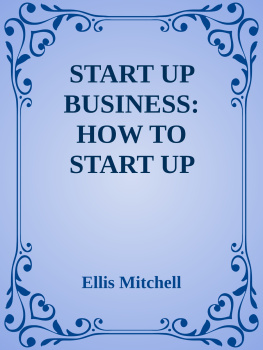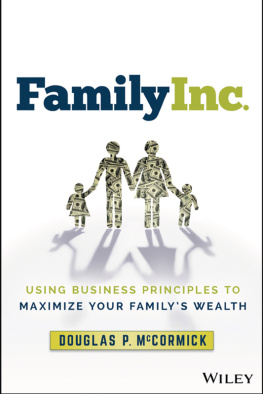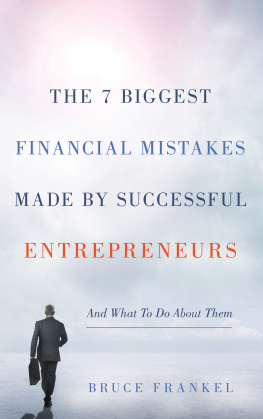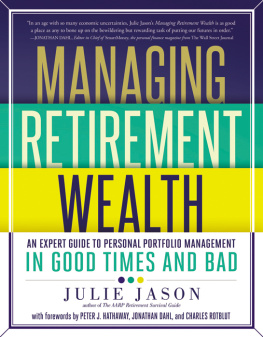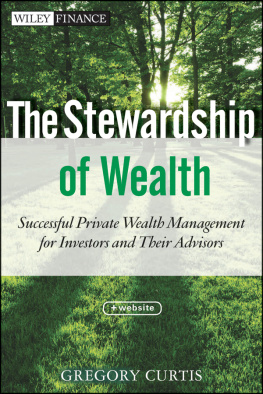All rights reserved.
Introduction
Why You Need This Book
I met Damocles about ten years ago. He was a vigorous seventy at the time, and I happened to be seated next to him at a venture capital conference held in a downtown high - rise .
Maybe youve been to one of these conferences, where established businesspeople with money to investmostly older mencome to mix with eager young people pitching nifty ideas.
Id accepted the invitation more out of curiosity than a desire to jump into a new business, but I sat with the group of potential investors. Before the show started, I started exchanging pleasantries with this remarkable man.
I was immediately impressed. Damocles had built up a line of minicomputers back in the 1980s and then successfully sold his business to IBM when he was in his fifties, just before minicomputers became obsolete. IBM had paid him tens of millions of dollars, equivalent to much more in todays money.
Hed been retired for nearly two decades, and he had that wonderful lookthe relaxed smile of a wealthy, accomplished man. I learned that he lived in a fabulous neighborhood, right next to the Congressional Country Club. He and I enjoyed the show together, laughing at the questionable pitches and comparing notes on the best ideas.
We exchanged cards, and a few days later, I gave my new friend a call. Im on the board of a nonprofit that provides social support to kids with cancer and their families. Our annual gala was coming up, and I was expected to invite as many wealthy people as I couldfolks who could afford the $250- a - plate ticket. Because he lived nearby, Damocles seemed like a sure bet.
When I called, we again chatted agreeably, but when I asked if hed attend the gala, he hesitated. I began to explain how meaningful I found the work of this nonprofit, but he didnt let me go on too long before he interrupted.
Michael, its not that I dont want to help. Its that I dont have the money.
I laughed because I honestly thought he was joking. No way! Didnt you make tens of millions of dollars when you sold your company?
Yes, said Damocles, but Ive made a few financial mistakes since I retired. You might call them big mistakes. Im now down to my last $200,000.
I still thought he was kidding. Come on! Just the other day, we met at a venture capital event. Werent you there looking for new ideas to invest in?
No, Michael. I wasnt there looking to invest. I was looking for a job. Im pretty desperate, and I thought maybe one of these startups needed a CEO. Thats the only job I know how to dobe a great CEO. Unfortunately, nobody wants a seventy - year - old CEO.
Damocles is not my friends real name, of course, and I wont burden you with all the mistakes he made with his money over the years. I will only mention the dot - com bubble at the turn of the new century and the fact that Damocles had a stockbroker for a son.
The Sword above the Throne
In the ancient Greek tale, Damocles lived in the court of Dionysius II of Syracuse. One day, when he was praising the power and wealth of Dionysius, extolling the kings great fortune and magnificence, Dionysius made Damocles an offer. The king suggested that his courtier switch places with him for one day so Damocles could really understand what it felt like to be so fortunate and magnificent.
Naturally, Damocles accepted. The next day, he seated himself eagerly on the kings throne, surrounded by gold and silver and attendants. But to ensure that Damocles got a full understanding of a great fortune, Dionysius arranged that a gigantic sword be hung right above the throne, suspended by a single hair from a horses tail.
All day long, Damocles stared nervously up at that sword, until he finally begged the king to release him from the throne, realizing that with great fortune and power always comes great danger.
When he related this tale, the philosopher Cicero asked, Does not Dionysius seem to have made it sufficiently clear that there can be nothing happy for the person over whom some fear always looms?
Seeing the Sword
As a financial advisor who works with many wealthy individuals, the conversation with my own Damocles really shook me. I asked myself, How could a person so successful in businessa former CEOmake so many mistakes and do such bad planning with their own money?
I began to think about the successful entrepreneurs I knew in my advisory and quickly realized that the mistakes of this particular Damocles were not at all unusual. When I did a little research, I found his situation quite common.
In fact, I found examples right in my own family.
I have a group of relatives who were natural entrepreneurs. For a time, they were extremely wealthy and were the envy of everyone I knew when I was growing up. These relatives started in the garment industry back in China and then moved into large - scale recycling when they came to the United States. They figured out how to collect massive quantities of copper wiring and electrical componentseven whole shipsand send them over to China for separation and processing.
As their wealth expanded, so did their businesses. They moved into power generation in China. Then tourism to China. Unlike most people, they not only saw brilliant opportunities but also made the most of those opportunities and had the much - celebrated entrepreneurial courage to take risks. Eventually, they worked out of an office in a Manhattan skyscraper, threw enormous parties, and bought spectacular homes.
But all along, these very smart people failed to notice the sword hanging above their heads. It was a sword that hung by a single thread: the trade policies of the Chinese governing imports, tourism, and joint ventures. When one day, lo and behold, government officials made changes to these policies, all the family enterprises came tumbling down in the space of just two years.
To the shock of my extended clan, these once - awesome relatives went bankrupt.
When that occurred, the great patriarch of the businesses was in his eighties, and he lived to see all three of his sons go bankrupt with him. One son even went to jail. Can you imagine falling from that height when you are in your eighties? Can you imagine seeing your family go down with you? Fortunately, the bankruptcy judge allowed him to keep his Manhattan condo so he would not become homeless.
Throughout this book, you will hear more stories from my clients and from my own life about the ways in which the entrepreneurial personality often destroys the very wealth it creates.
Escaping Fear
This is a book for successful entrepreneurs who may or may not see the sword of Damocles hanging above their own heads. People who have the entrepreneurial instinct but need to make sure that instinct brings them happiness instead of pain. People who love to take risks but need to control those risks when it comes to their personal lives.
Unlike most books for entrepreneurs, this is not a business book; its a wealth management book. Indeed, one of my key goals will be to get you to move your wealth, little by little, out of your dangerous throne room and into a safer place.
Most of my readers will be in their forties, fifties, or sixties. You may be in the midst of your business growth, not yet thinking about your exit from your business. You may have begun trying to plan your exit. Or you may think you love the company you built so much that you will never wish to leave.


